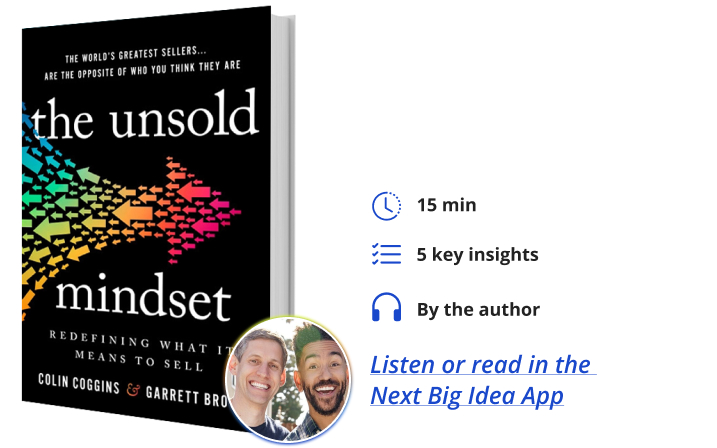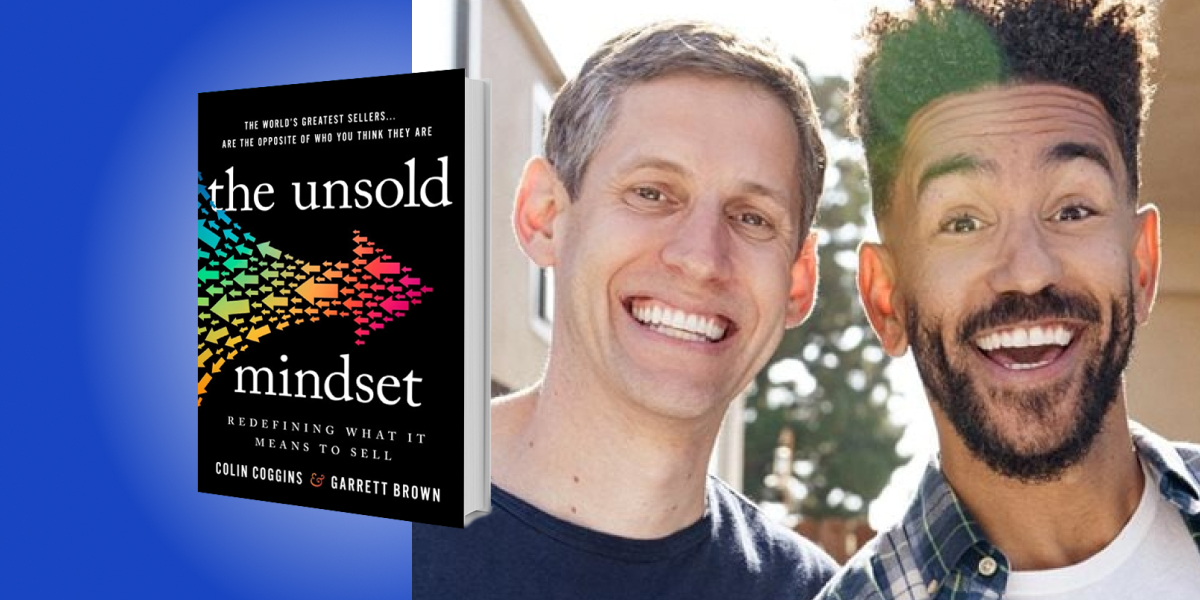Colin Coggins and Garrett Brown are authors, speakers, and professors who teach the popular class they created, Sales Mindset for Entrepreneurs, at the University of Southern California’s Marshall School of Business. As sought-after speakers, they bring their antithetical, mindset-first approach to audiences around the world. They are also co-founders of Agency18, a firm that helps mission-driven companies adopt the Unsold Mindset.
Below, Colin and Garrett share 5 key insights from their new book, The Unsold Mindset: Redefining What It Means to Sell. Listen to the audio version—read by Colin and Garrett—in the Next Big Idea App.

1. The best salespeople on the planet are the opposite of who you think they are.
The greatest salespeople on the planet aren’t the best at overcoming objections. They are not the most extroverted. They’re not the most social or self-confident. But they are, for instance, the most socially aware. They know that when they’re talking to someone, that person is probably waiting to speak and so they recognize when something they’ve said didn’t land. And they’re able to course correct. The greatest salespeople are not optimistic because of naivety. They’re optimistic because they know what it feels like to talk to someone when you don’t need anything from them.
What’s represented in The Unsold Mindset is also represented in our classroom. A third of our class shows up every week because they want to learn how to sell themselves and build relationships so that they can become leaders. A third of the class shows up because they want to learn how to sell ideas, and they too want to become leaders. Then a third of the class shows up because they want to learn how to sell products and services. Regardless of what reason they show up for, one thing is certain: they’re going to leave realizing that every single person, every single day, is selling something.
We started our journey to figuring out what the core tenets of the Unsold Mindset are by asking a couple of key questions. We asked it in front of every audience, be that our classroom or the salespeople and non-salespeople we interact with daily. The first question we ask is, What do you think of when you hear the word salesperson? The answers are often colorful. Everything from sleazy, slimy, pushy, and manipulative to maybe extroverted or hard-working. There’s always a subtext, though, that we do not like salespeople.
The second question we ask is, Who is the greatest salesperson you know? Now, this person doesn’t have to be alive and you don’t have to know them personally. They can be a celebrity. What’s most interesting is the overwhelming top two answers that we get are Martin Luther King, Jr. and Steve Jobs.
“There’s always a subtext, though, that we do not like salespeople.”
Our book lives in this incongruence between asking someone what they think about the word salesperson, and they say, “Yucky,” and then asking someone who the greatest salesperson is and they say, “Martin Luther King, Jr.” We went out and we interviewed these great sales professionals and asked them, Who’s the greatest salesperson you know? Every single one of them introduced us to people that weren’t sales professionals and, regardless of their actual professional title, we realized they are all unsold on who they were supposed to be. They are unsold on who the people around them expect them to be, and on the way they are supposed to do things.
2. The greatest salespeople give themselves permission to be authentic and vulnerable.
Not just authentic in the buzzword sense, but hyper-authentic. The most successful salespeople create an infrastructure that mitigates inauthenticity.
An example of this is intentional ignorance. Many people would tell us that what they are good at and what they love doing are not always the same thing. For them to show up passionately, authentically, every single time, they would intentionally ignore parts of their work that would have them show up otherwise. We saw it everywhere. We talked to a number one salesperson who refused to look at the firmographic data information of where his leads come from. This person understands that he will treat people differently based on knowing where they come from because then he’ll know the propensity to buy. He didn’t want that influence.
Also, we spoke with General Stanley McChrystal. He led tens of thousands of soldiers. He said that normally people expected a general to puff out their chest, bark orders, and have all the answers. He told us he never did that because he knew what he was good at and where his attention was most valuable. For him, he was more excited about empowering people around him to do what they were best at. So instead of having answers, he knew where to find those answers by finding the people whose passions were the things that he didn’t necessarily know a lot about.
We also talked to an advertising executive who did not enjoy technology. Every time people asked her about technology, she would honestly say, “I don’t know.” But then she would go out and find the answers. She told us that the inflection point in her career was when she realized that people didn’t just want her to have the answers. They were valuing her as being resourceful more than as someone who has the answers.
These examples are not just about authenticity but also vulnerability. People would be so vulnerable with us that they would talk to themselves out loud in front of us. It was the weirdest thing and happened regularly. We talked to a sales executive who started the conversation saying, “Hey, my name is Jason. I’m…” He trailed off, looked up at the ceiling and said, “Why do I keep doing that?” Then he looked back at us, and reintroduced himself. We couldn’t understand why we liked this guy so much. Upon reviewing the tape, it was those three seconds, that micro-moment of connection.
“He, like other great salespeople, didn’t know he was doing it.”
A few days later, we were talking to one of the top trial lawyers in California. He told us a similar story about sitting in front of a judge and jury. Talk about a tough sale: his customer (the jury) is sitting there, but also his competition (in the form of the other lawyer) is sitting next to him poking holes in his sale. So, in his story, he was making some kind of argument, and the judge asked him to repeat himself. He stopped, looked up at the ceiling, and said, “What did I just say?” Then he looked back at the judge and said, “Your Honor, I have no idea what I just said.” The judge laughed and the jury laughed. For that moment, he was not somebody trying to pull one over them on them. He was a human who was just as nervous as they were. And this wasn’t done by him intentionally as a tactic. In fact, he, like other great salespeople, didn’t know he was doing it.
Great salespeople have given themselves permission to be so authentic and vulnerable that they are comfortable having those conversations out loud in front of other people. We call this showing your work. They’re letting the people that they’re talking to in on their thought process, and they’re getting rewarded for it.
We’re not telling you, “Oh, act authentic or be authentic.” What we’re saying is that all these people gave themselves permission by building an infrastructure to allow themselves to be the most authentic person in the room at any given time.
3. How sellers view themselves.
A great seller doesn’t view their job as trying to persuade others to do something. We talked to great salespeople both with and without sales in their titles. They would say things like, I’m a teacher, or, I’m a problem solver. They reframed what they were doing to make it about the other person. They weren’t just adding value. They were valuable by making everyone around them better. They weren’t just doing this in grandiose ways. It was as simple as asking questions someone actually wanted the answers to.
“Great sellers do one thing exceptionally better than most people: they ask questions that people haven’t heard of before.”
Creating a sense of agency in the people that you are selling to is paramount to a successful relationship. Great sellers do one thing exceptionally better than most people: they ask questions that people haven’t heard of before. These weren’t leading questions, and they didn’t know the answers either. We watched it unfold many times when someone would ask a question, and then the listener would ideate on that question because they had never heard it before. Whatever the answer was, they took ownership of it. They didn’t feel like they were being sold. They were buying, because it was their answer, because they had the agency. They felt like they were part of the process and the decision-making. We call those impactful questions, meaning questions that force the person answering it to ideate in real time for the first time about something they have never thought of before.
4. Goals are stronger with purpose.
We wanted to understand how great sellers set goals and why they set those particular goals. But every time, the conversation always turned towards purpose.
We would ask them: Tell us about your goal orientation. Tell us about your goal process. And they would figure out a way to stick the word “purpose” in, but we were never asking about purpose. Then we saw that it was a scaled response. We would sit in front of crowds, when we gave keynote speeches, for instance, and say, “Hey, put your hand up if you have goals.” Everyone would raise their hand. Then we would say, “Only leave your hands up if, in addition to having goals, you also have your purpose articulated.” Almost everyone puts their hand down. These great sellers would have kept their hands up because they view their purpose as the finish line and their goals as mile markers.
5. Great sellers conditioned themselves to look for the good.
The brain is malleable. It will look for and find anything, be that noticing the good or always seeing the bad. For these great sellers, being able to curate an experience in their own heads, knowing how to look for the good and find it, was a key separation between them and everyone else.
They celebrate failures and they celebrate successes differently because of it. They look for obstacles. They understand that to have a breakthrough, they need to break through something. This creates a textured experience for them. They talk as if, wherever they are, they’re in the best part of the movie and they refuse to waste the best part of the movie being someone that they’re not.
To listen to the audio version read by co-authors Colin Coggins and Garrett Brown, download the Next Big Idea App today:
































